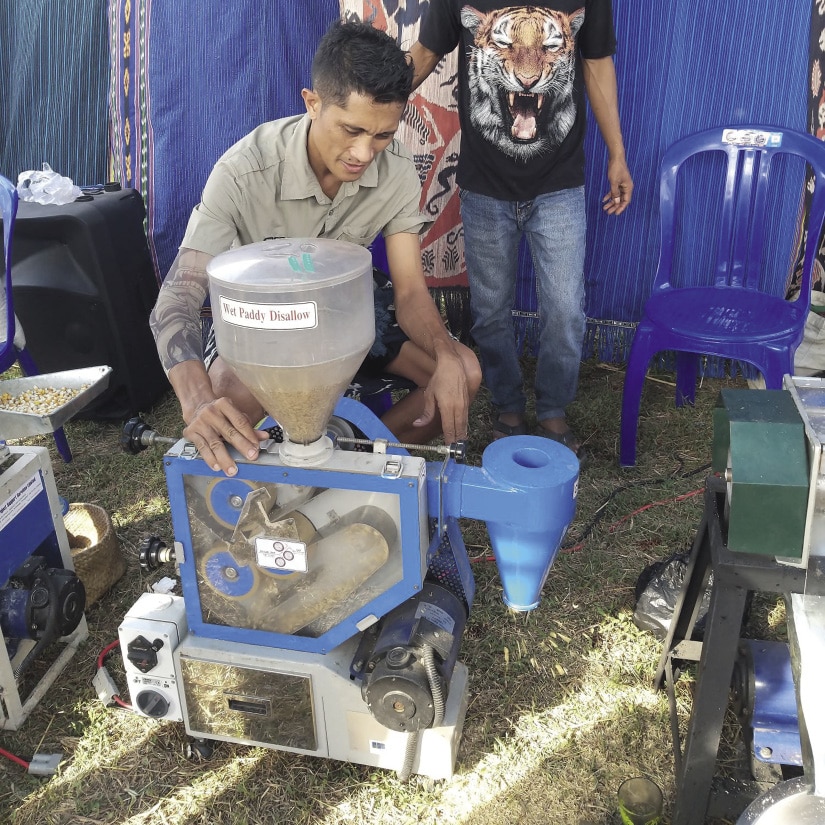Kopernik was established in 2010 by two founders, Toshi Nakamura and Ewa Wojkowska. Both of them had formerly worked for the United Nations on various development projects. Kopernik conducts experiments to find the best solutions to meet the real needs of people living in Indonesia’s “last mile” – beyond the reach of the electricity network. They also collaborate with the private and public sectors to deliver various clean technologies such as solar lights, solar home systems, clean cookstoves, and water filters.
Sumba is located southeast of Bali, in the Lesser Sunda archipelago. In 2019, the island attracted about 38,500 international and local tourists. However, much of Sumba’s population lives in poverty. Sarah Hobgen, the founder of Sumba Sustainable Solutions (3S), started an initiative to empower people there in 2019.
The main goal of 3S is to help people in Sumba to find fulfilling employment that also benefits the environment. Before she started 3S in 2019, Hobgen worked for projects with the U.K.-based Village Infrastructure Angels and the Sumba Iconic Island Program, a collaboration between various governments and NGOs, to deploy solar home systems. With 3S, she introduced the idea of eco-tourism to Sumba villages and built tourist bungalows, using bamboo as a building material and with a clean electricity supply.
Affordable solar
“The solar lantern is one of the simplest technologies, very intuitive and easy to understand how it works,” explains Ewa Wojkowska, the co-founder of Kopernik. “People get it straight away, and it is so much better compared to a candle or a kerosene lamp.”
At the end of 2020, Kopernik garnered the support of the Zayed Sustainability Prize – an initiative of the Abu Dhabi government in the United Arab Emirates. UAE-based developer Masdar provided Kopernik with the funds to deploy 3,600 solar lanterns and 1,000 mobile charging solar lanterns to fishing communities in Laut Selatan Island, off the southeastern coast of Borneo.
D.Light, a U.S.-based solar lantern maker, supplied the hardware for the Laut Selatan project. Kopernik also invited the women from the village to work selling solar lanterns, solar home systems, and water filters, as an opportunity for economic empowerment. The cheapest solar lantern offered by D.Light starts at around $7. D.light also offers solar home systems for lighting through installment payments. In addition to D.light, Greenlight Planet, a U.S.-based solar energy supplier, has teamed up with Kopernik.
In Sumba, Hobgen also works with Greenlight Planet to supply solar technology. People in the villages that want to have a solar light with 6 kW can pay installments of IDR 50,000/month ($3.60/month) for three years.
For occasions when a local farmer or fisherman could not afford the solar lights, Hobgen needed a bright idea. It came in the form of non-cash payments. “First, the locals understood ‘non-cash’ as trade with livestock such as chicken or goat. It was difficult for us to maintain this livestock, so instead of that, we suggested they trade with woven fabrics or crafts or agricultural products,” explains Hobgen.
Given the handicraft currency, locals quickly started to produce more of Sumba’s traditional woven fabrics: woven bags from pandan leaves, and other products such as coconut oil, coconut sugar, and even bamboo. Hobgen also helps them to sell these products online.
“Many people want to electrify Sumba by giving solar lanterns. I believe they all have good intentions to help; however, it would just pile up electronic trash if we did not maintain it well,” Hobgen notes. Besides delivering technologies, 3S also offers their maintenance.
The Covid-19 pandemic has hit Sumba’s tourism industry significantly. The demand for traditional woven fabrics and bags decreased. As a result, the locals focus more on producing agricultural products. 3S provides solar-powered corn and rice mills for farmers.
“Instead of grinding corn manually with stones or pounding rice in a wooden tub, we lend them the mills for just IDR 500, or $0.03 per kilogram,” says Hobgen. Before solar mills were introduced, locals sold the products dried at a lower price. Now their product can reach a sales price 10 times higher on the market.
“There are many wrong perspectives about people living in Sumba’s villages. Many think that Sumba’s people are lazy, but this is wrong. They did not have access to electricity, but now they do. And it increases their productivity,” Hobgen says with pride. Now, even after sunset at around 6 p.m., people in the village can continue to make woven bags or fabrics and process agricultural products, while children can study.
Both Kopernik and Sumba Sustainable Solutions have been awarded international prizes. In 2016, Kopernik picked up the Zayed Sustainability Prize, but 3S did not miss out, as it has been recognized for its innovation in appropriate technology distribution from D-Prize, a U.S.-based NGO. On the basis of the D-Prize award, 3S partnered with the Honnold Foundation to provide solar power home systems from recycled materials.
Sorta Carol
This content is protected by copyright and may not be reused. If you want to cooperate with us and would like to reuse some of our content, please contact: editors@pv-magazine.com.
